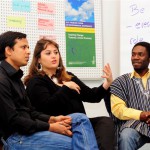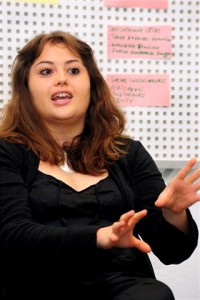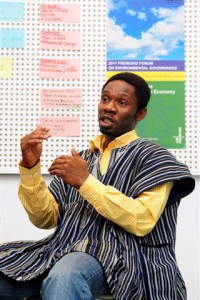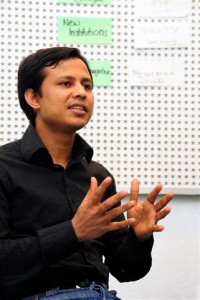Talking with DAAD scholarship holders
 “I also have the power to make a difference” – this is one of important insights gained by DAAD scholarship recipients during the conference on Green Economy held in Freiburg at the end of February. Kwame Ababio from Ghana, Khan Mehedi Hasan from Bangladesh and Ericka Toledo Zurita from Mexico share their observations and talk about the situation in their home countries.
“I also have the power to make a difference” – this is one of important insights gained by DAAD scholarship recipients during the conference on Green Economy held in Freiburg at the end of February. Kwame Ababio from Ghana, Khan Mehedi Hasan from Bangladesh and Ericka Toledo Zurita from Mexico share their observations and talk about the situation in their home countries.
How is the issue of sustainability treated in your country?
Khan Mehedi Hasan: Climate change has turned Bangladesh into one of the most vulnerable countries on Earth. Floods and cyclones are more common than before. The most devastating cyclone hit in 2007, taking many lives and causing USD 1.7 billion in damages. We need to address these catastrophic changes.

Ericka Toledo Zurita (30) from Mexico is a lawyer for environmental law. She is enrolled in the DAAD-sponsored Masters programme in Environmental Governance at the University of Freiburg.
Ericka Toledo Zurita: Mexico has a different problem. The gulf between the tremendously wealthy and the absolute impoverished is extreme. Here’s another example extremes: At the World Fair in Shanghai, Mexico received an award for the first sustainable city in the Americas. At the same time, the populations of our cities are exploding and the amount of resources consumed is inordinate. And the pollution caused by the manufacturing industry is also taking its toll. Mexico has a great variety of plants and animals. Many people, and especially the poor and less educated, do not understand what a huge asset our country’s incredible biodiversity is – and it’s slowly being destroyed.
Kwame Ababio: In Ghana the issue is food security. Ghana’s rural communities cannot provide for themselves, they are dependent on humanitarian organisations and ultimately, they end up migrating to the cities where poverty is even greater. Many do not have access to safe drinking water and the ravaging of the countryside continues. Ghana is trying to turn this situation around. I worked on a project, for example, that supports people in producing their own honey or growing their own mushrooms, keeping them from hunting these things in the forest and cutting down trees. There’s simply not enough money, however, to make these kinds of changes in a larger, bigger-impact context.
What are the chances for the green economy in developing countries?

Kwame Ababio (32) from Ghana works for an NGO. He is now a graduate student in the DAAD-sponsored Masters programme in Environmental Governance at the University of Freiburg.
Kwame Ababio: Theoretically, Ghana is already addressing issues in sustainability. We have great legislation set up to drive sustainability. Implementing it is a problem, though. African farmers are required to use organic fertilisers, but the fact is even now they are unable to compete economically. Feed is far too expensive and agriculture is subsidised in industrialised nations.
Khan Mehedi Hasan: We need advanced technologies to increase our sustainability. Even in Germany, people cannot afford to build a passive house. How should this be suddenly possible in a developing country? Or take nutrition, for example. People living in a poor country do not have the luxury of contemplating how a product is made. They’ll always choose the most affordable products.
What have you gained from the Freiburg conference in terms of new ideas?
Ericka Toledo Zurita: As a lawyer for environmental law, I am well aware of the “bad” things in my country. During my studies in Germany and at the conference as well, I realised how ignorant people are about what is happening in other parts of the world. Very few people truly understand the complexity of trade mechanisms. And very few are interested in taking a hard look at these processes in terms of their environmental sustainability and changing them.

Khan Mehedi Hasan (28) from Bangladesh taught economics at the University of Khulna. He is currently enrolled in the Masters programme in International and Development Economics at the University of Applied Sciences (HTW) in Berlin, a DAAD programme.
Khan Mehedi Hasan: I teach economics at the University of Khulna. It was really interesting for me to speak with other academics at the conference. As for my own personal insight, I believe that the industrialised nations are largely responsible for the climate change in Bangladesh. The people in Bangladesh are waiting for them to begin adopting protective measures. But what Freiburg showed me is that developing countries can take action, even when countries in the industrialised world refuse to. Just because the world cannot unite and work together doesn’t mean that everyone should fall into a deep sleep and simply do nothing.
Kwame Ababio: That’s right. I go to many conferences and am always on the look-out for something new. In Freiburg I learned that change is triggered and driven by individuals. National governments are usually controlled by multi-national, profit-oriented organisations. But a well-organised group of people or region can make change happen. I also have the power to make a difference.





